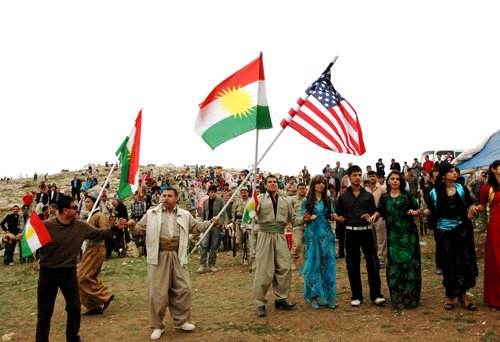
Residents of the Kurdistan Region presently feel let down, if not outright betrayed, by the United States and the Western world. Despite the sacrifices of their vaunted Peshmerga soldiers in the war against ISIS, none of these powers have done anything to help while the Iraqi military snatched up all their territories beyond the region's Green Line, most notably Kirkuk. Washington needs to act sooner rather than later to rectify this crisis.
Invariably the US has said that it's allied with both sides, the Kurdistan Region and the federal government in Baghdad, and thus doesn't want to see them clash. The aggression perpetrated by the latter, however, cries out for a response.
For one, the US should draw its own line along the Green Line that demarcates the autonomous Kurdistan Region from Iraq and openly declare that the US military is willing to enforce a defense against any Iraqi military incursions into any of Kurdistan's undisputed autonomous provinces – Erbil, Duhok, Sulaimani, and Halabja.
US Apache attack helicopters operating out of Erbil International Airport were videoed hovering over the battlefield between Peshmerga and Iraqi Army/Hashd at Pirde (Altun Kupri) just south of Erbil Province's frontier with Kirkuk Province, on Friday. Washington should have no compunction about deploying such weapons to defend Kurdistan and its people from any attack. It could condition its support and guarantee of Kurdistan's continued sovereignty and security on the Peshmerga not advancing beyond the Green Line in an attempt to forcibly wrest back control of the territories.
As analysts Michael Knights and David Pollack of the Washington Institute note: “This crisis is likely to damage US credibility, in Iraq and beyond, if Washington does not assertively and publicly demarche Baghdad at this point, and make demonstrations of military force – overflights, visible surveillance, observers on the Kurdish side – to show that 'enough is enough.'”
This action should be a purely defensive one for a longstanding US ally against murderous Iranian-backed Shiite Hashd al-Shaabi forces that have the blood of Kurds, as well as American servicemen back in the days of the Iraq War, on their hands.
Secondly the US should stop ignoring Iraq's usage of the Hashd forces with close links to Iran against Kurdish forces in the past week. Instead it should halt further delivery of all spare parts of US-made Iraqi military hardware, along with the remaining F-16 jet fighter-bombers scheduled for delivery to the Iraqi Air Force, until an honest and thorough investigation is done to determine if US-made M1 Abrams tanks were knowingly passed on to Hashd. Baghdad should be told in clear terms by Washington that action needs to be taken following the outcome of such an investigation if it wants continued support.
Furthermore, Washington should also warn the conventional Iraqi forces that if any American arms are used against the Kurds in the future that will immediately waive the prior conditions under which the arms were sold to Iraq in the first place and result in penalties.
Taking these steps could effectively freeze the conflict where both sides currently stand. While it will immediately disadvantages the Kurds, who've lost a whopping 40% of the territories they have a rightful claim to ownership over, it will nevertheless give them an opportunity to demonstrate that their claim to these areas is indeed legitimate under the constitution. Washington can then push Baghdad to first cancel its unrealistic demands from Kurdistan to begin negotiations and uphold the same constitution it has frequently cited in recent months and resolve the disputed territories issue through implementation of Article 140, or a new comparable alternative that includes censuses and referendums carried out in the areas in question.
There are already some reassuring signs that steps might be taken in this direction. In her statement on Friday's clashes in Pirde the US State Department's spokesperson Heath Nauert unequivocally affirmed that “The reassertion of federal authority over disputed areas in no way changes their status – they remain disputed until their status is resolved in accordance with the Iraqi constitution.”
Washington could broker a comprehensive settlement between Baghdad and Erbil with international observers. Since it still wants to uphold friendly relations with both sides it could advocate demilitarized zones in these areas, save for some armed provincial police and security forces, which could serve as buffer zones between Iraqi and Kurdish forces similar to the demilitarization of the Sinai Peninsula in the Camp David Accords between Israel and Egypt just under 40 years ago.
All of these options are far from perfect, but are nonetheless a whole lot better than risking more clashes and bloodshed.
Hi! I am a robot. I just upvoted you! I found similar content that readers might be interested in:
http://www.rudaw.net/english/opinion/23102017